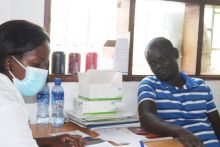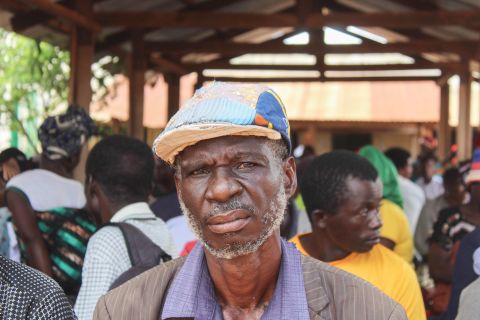Basic
Mozambique’s healthcare system is weak and medical facilities are lacking crucial infrastructure. SolidarMed supports the system as part of various projects. Setbacks like Cyclone Chido highlight the importance of these efforts and the team’s dedication to the health of the population.
Content
Content Media
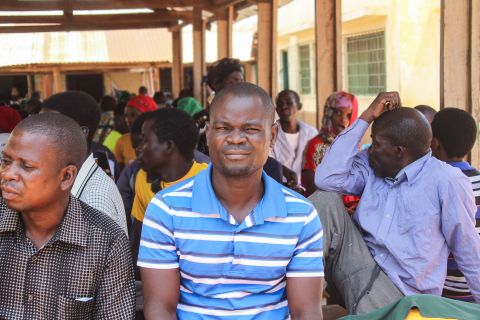
Content Text
When Pedro Pascoal was diagnosed with HIV almost five years ago, he felt as though his world would collapse. But he has now got his life back – thanks to the care he received from the healthcare facility in Chiúre. This is where he regularly collects the drugs that suppress the virus. These antiretroviral therapies involve consultations to ensure that patients are well looked after. SolidarMed refurbished the consultation room where patients are counselled and given their medication over two years ago. Efforts were made to ensure that people who come here for treatment are able to talk to their doctor discreetly and in confidence, without having to fear prejudice, degradation, social exclusion or stigma. But this is no longer possible.
Fuel to transport patients
Just before Christmas, SolidarMed’s project region in Mozambique was hit by Cyclone Chido. Almost half a million people were affected. Over 100,000 houses were partially or completely destroyed, including 250 schools and 52 health centres. As an initial measure SolidarMed supplied healthcare facilities with fuel so that patients could be transported elsewhere.
Content Media
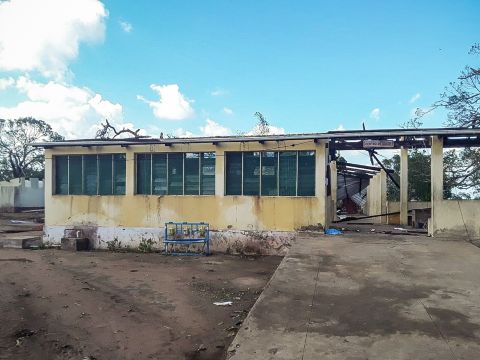
Content Text
The infrastructure in various healthcare facilities in which SolidarMed operates has in some cases been severely damaged. For example, the storm ripped huge holes in the ceiling of the treatment rooms where Pedro Pascoal usually receives his therapy. People now have to improvise. After their consultations, patients now have to go to another room in a completely different part of the damaged hospital to collect their medication.” Those who can’t find the way and daren’t ask where HIV medication is dispensed for feat of stigmatisation, might go home empty-handed,” fears the 50-year-old grandfather of four. Hospital staff are overstretched and are focused on renovation rather than temporary solutions. Cristóvão Momade also picked up his medication. Like Pedro Pascoal, he first had to find the right room in the damaged hospital. The 31-year-old managed to do so and is pleased that he was able to access free medication and care at the health centre.
Poverty, conflicts, cyclones
Access to healthcare doesn’t only depend on financial resources, geographical proximity or qualified medical staff, but also on functioning infrastructure. This is why SolidarMed is making targeted investments in the expansion and equipment of healthcare facilities – including in Mozambique. SolidarMed has been working in the East African country, which is one of the world’s poorest, for 29 years.
The project region is located in the north of the country, where the health system is not only burdened by poverty, but also by the thousands of extra people who have fled there due to the ongoing conflict. The over 728,000 people in the project region face the additional challenges of cholera outbreaks and communities that are cut off from the world. If a cyclone such as Chido then kills or injures people, makes roads and paths impassable, ravages fields, and destroys infrastructure such as buildings and power supply, these people become reliant on urgent support.
Content Text
Almost every project that SolidarMed initiates in northern Mozambique has an infrastructure component. If waste disposal and hygiene processes in hospital settings are sub-optimal, patients and healthcare workers can contract diseases which then spread rapidly. Hospital hygiene is therefore paramount. This is why SolidarMed supports the renovation of healthcare facilities on an ongoing basis and provides special infrastructure such as incinerators to control infection. Waste disposal has been improved at six facilities in the Cabo Delgado Province. But here, too, the cyclone has caused damage. In the hospital in Chiúre, for example, the sterilisation area was ravaged, so equipment had to be urgently sterilised in the hospital kitchen. As this is critical for both patients and healthcare professionals, repairing and restoring the sterilisation area is one of SolidarMed’s priorities in the aftermath of the cyclone.
Deteriorated water quality
The importance of spaces that guarantee patient privacy is not only shown by the example of the two men who had to collect their HIV medication. Adolescents also need spaces where they can talk about personal topics in confidence. SolidarMed set up youth-friendly spaces for this purpose but some of these were also destroyed by the cyclone. “The damaged roofs are being repaired as quickly as possible so that young people can continue to count on discretion and confidentiality when they come here for advice,” says Barbara Kruspan, SolidarMed Country Director in Mozambique.
The destruction of infrastructure caused by the cyclone has led to a deterioration of water quality. Three quarters of the population gets their water from open wells in which water can easily be contaminated. Heavy rain has also caused latrines to overflow, which pollutes the unsecured wells. This encourages the spread of diseases such as cholera, which are transmitted though dirty water. This is why the acute diarrhoeal infection occurs almost every year. Most private houses are built of bamboo, clay and grass. These buildings don’t offer any protection against mosquitoes, which carry various diseases, particularly malaria. After so many buildings were razed to the ground in the project region, it is feared that cases of cholera and malaria will increase. And this amid some 40% of healthcare facilities affected by the cyclone, making it more difficult to treat patients.
Content Text
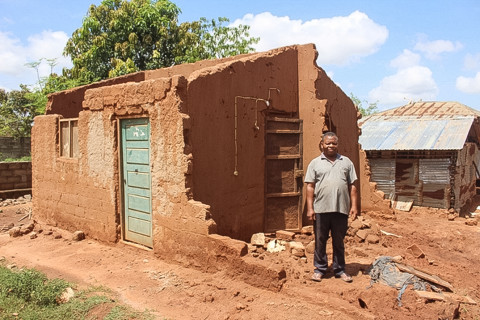
SolidarMed staff also affected
Some SolidarMed staff members also lost their homes due to the cyclone and one person even had to go to hospital. “We have set up a fund for our employees, which will allow them to repair their homes. A committee made up of employees decides how the funds are used,” explains Barbara Kruspan, SolidarMed Country Director in Mozambique. The infrastructure in the SolidarMed offices was also affected. The power supply was quickly restored using solar panels. Despite the injuries and damage, the team remains highly motivated.
Picture: The home of Agostinho Direito, SolidarMed office security guard, was completely destroyed in the cyclone
Content Text
Even in projects where it may not seem immediately obvious, infrastructure and equipment play a key role – for example in improving maternal and child health. Pregnant women who experience complications during delivery benefit from the recently refurbished, functional operating theatre in Metoro Hospital. The region has very high maternal mortality. In order to reduce it, it is crucial that women can access appropriate care. But when the power supply is unreliable, this care is jeopardised. “Power supply in healthcare facilities is key for the refrigeration of medicines, vaccines and blood supplies, and is crucial to the functioning of labs,” stresses Barbara Kruspan.
Challenge: Finding good professionals for reconstruction
One thing is clear: without functioning infrastructure, there is no healthcare. In the last 20 years, SolidarMed has built five health centres in the Chiúre, Ancuabe and Namuno districts. “The biggest challenges are not only the building costs which are being pushed up by rising prices in Mozambique. Good engineers and architects first need to be recruited for the construction, and then maintenance and upkeep also need to be guaranteed,” explains Jochen Ehmer, former SolidarMed Country Director in Mozambique and now Head of Medicine and Public Health.
Zitat
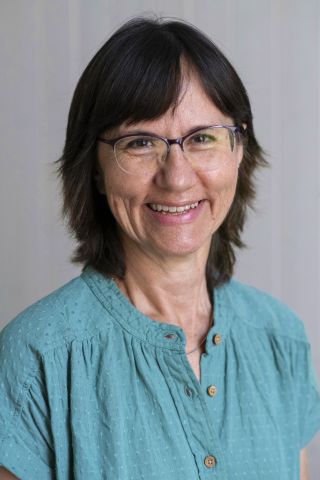
Content Text
What’s next for Mozambique? “The health authorities are analysing the damage and the resulting needs. We will then look at the list of work to be done drawn up by the infrastructure department of the health authorities,“ explains Barbara Kruspan. The authorities are very interested in ‘building back better’ – a slogan that really needs to be taken seriously. “This means that if possible, they would like to build roofs that are cyclone-proof,“ she says.
Risk of treatment being discontinued
There are around 1.5 million people living with HIV in Mozambique. Pedro Pascoal and Cristóvão Momade are just two of them. They explain how
important it is for them to be given their medication in a protected space, to know that their patient records are stored securely, and not to expose themselves unnecessarily: “Since the storm we haven’t been able to talk openly about our feelings and health, as there’s no privacy.” This could lead to problems not being addressed and treatments being discontinued, which in turn will affect people’s health. This is why SolidarMed is pulling out all the stops to ensure that the infrastructure is rapidly repaired and rebuilt
